情态动词讲解can,may,should,must,oughtto区别及用法,,练习加详解
中考情态动词讲解之can,may,must,should区别

中考情态动词讲解之can,may,must,should区别can, may, must, should区别1. Can (过去式could) 可表示下列三种意思:A. possibility (可能性) (表示理性的猜测,与事实村子与否无关。
)1) 专家也可能犯错。
Even experts can make mistakes.2) 她的表现是我们所能期望的最佳状态了。
Her performance was the best that could be hoped for.B. Ability (能力)3) 你能解决这个问题吗?Can you solve this problem?4) 约翰十岁就会说五种语言。
John could speak five languages by the age of ten.5) 下星期我就能解决这个问题I will be able to solve this problem next week. (√)I will can solve this problem next week. ( ×)6) 事情总会水落石出的。
The truth will be found out. (√)The truth can be found out. (×)C. permission (允许)7)我可以用你的电话吗?Can I use your phone?8)二十年前妇女在选举时不能投票。
A couple of decades ago, women could not vote in elections.2. May (过去式might) 可表示下列两种意思:A. possibility (可能性) (表示推测可能存在的事实)9)我们可能永远到不了山顶。
We may never reach the top of the mountain.10)可能有一些怨言。
情态动词的用法及其表达的意义
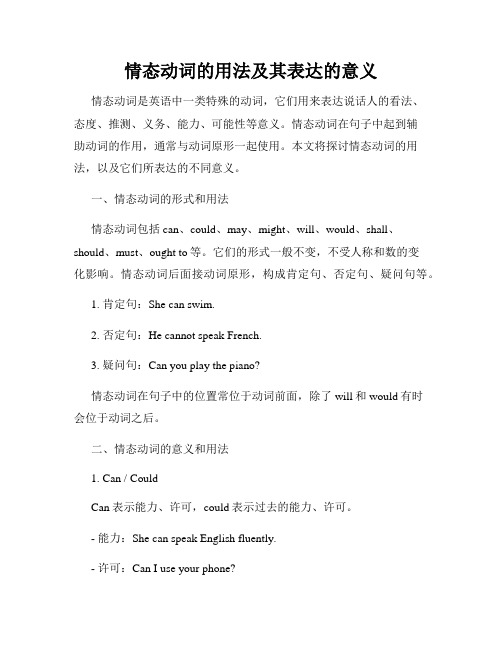
情态动词的用法及其表达的意义情态动词是英语中一类特殊的动词,它们用来表达说话人的看法、态度、推测、义务、能力、可能性等意义。
情态动词在句子中起到辅助动词的作用,通常与动词原形一起使用。
本文将探讨情态动词的用法,以及它们所表达的不同意义。
一、情态动词的形式和用法情态动词包括can、could、may、might、will、would、shall、should、must、ought to等。
它们的形式一般不变,不受人称和数的变化影响。
情态动词后面接动词原形,构成肯定句、否定句、疑问句等。
1. 肯定句:She can swim.2. 否定句:He cannot speak French.3. 疑问句:Can you play the piano?情态动词在句子中的位置常位于动词前面,除了will和would有时会位于动词之后。
二、情态动词的意义和用法1. Can / CouldCan表示能力、许可,could表示过去的能力、许可。
- 能力:She can speak English fluently.- 许可:Can I use your phone?Could也可以用于表示请求或委婉的建议:- 请求:Could you please help me with my luggage?- 建议:You could try the new restaurant in town.2. May / MightMay表示许可、可能性,might表示过去或将来的可能性。
- 许可:May I borrow your pen?- 可能性:I may go to the party tonight.Might也可以用于表示不太可能的情况:- 不太可能:He might not come to the meeting.3. Will / WouldWill表示意愿、预测,would表示过去的意愿、假设。
- 意愿:I will help you with your project.- 预测:It will rain tomorrow.Would也可以用于表示委婉的请求或建议:- 请求:Would you mind closing the window?- 建议:You would feel better if you took a break.4. Shall / ShouldShall通常用于第一人称,表示建议、义务,should则表示建议、期望。
初中英语语法深度解析情态动词的使用规则

初中英语语法深度解析情态动词的使用规则
在学习英语语法的过程中,情态动词一直是学生们比较困惑的一部分。
本文将深度解析初中英语中情态动词的使用规则,帮助大家更好地掌握这一知识点。
什么是情态动词?
情态动词是一类特殊的助动词,用来表示说话人对某种动作或状态的看法、态度、意愿等。
常见的情态动词包括can、could、may、might、shall、should、will、would、must、oughtto、need等。
情态动词的基本用法
能力与可能性:can表示能力,may表示可能性,might用于更委婉的表达可能性,should表示应该。
请求与命令:will用于请求,shall用于正式的命令或建议。
推测与猜测:must用于肯定推测,could用于猜测,might用于委婉的猜测。
情态动词的注意事项
情态动词后接动词原形。
情态动词没有人称和数的变化。
情态动词后面不加to。
情态动词的常见错误用法
将情态动词用于过去时:情态动词没有过去时形式,需使用情态动词的过去式形式表示过去的意义。
情态动词双重否定:情态动词后面的动词要使用肯定形式,不与否定词连用。
混淆情态动词的含义:不同的情态动词有不同的含义和用法,需根据具体语境正确选择。
初中英语语法中的情态动词是一个重要且常见的知识点,掌握好情态动词的用法能够帮助我们更准确地表达自己的意思,避免语言上的歧义和错误。
因此,在学习英语语法时,务必要重视情态动词的学习和应用,以提高语言表达的准确性和流畅性。
以上即为本文的全部内容,希望对您有所帮助。
情态动词的用法
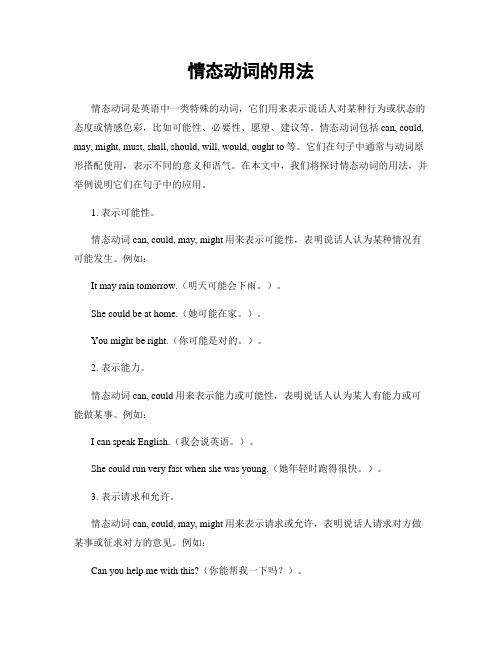
情态动词的用法情态动词是英语中一类特殊的动词,它们用来表示说话人对某种行为或状态的态度或情感色彩,比如可能性、必要性、愿望、建议等。
情态动词包括can, could, may, might, must, shall, should, will, would, ought to等。
它们在句子中通常与动词原形搭配使用,表示不同的意义和语气。
在本文中,我们将探讨情态动词的用法,并举例说明它们在句子中的应用。
1. 表示可能性。
情态动词can, could, may, might用来表示可能性,表明说话人认为某种情况有可能发生。
例如:It may rain tomorrow.(明天可能会下雨。
)。
She could be at home.(她可能在家。
)。
You might be right.(你可能是对的。
)。
2. 表示能力。
情态动词can, could用来表示能力或可能性,表明说话人认为某人有能力或可能做某事。
例如:I can speak English.(我会说英语。
)。
She could run very fast when she was young.(她年轻时跑得很快。
)。
3. 表示请求和允许。
情态动词can, could, may, might用来表示请求或允许,表明说话人请求对方做某事或征求对方的意见。
例如:Can you help me with this?(你能帮我一下吗?)。
Could I use your pen?(我可以用一下你的笔吗?)。
May I come in?(我可以进来吗?)。
4. 表示必要性。
情态动词must, should, ought to用来表示必要性或建议,表明说话人认为某种行为是必要的或值得做的。
例如:You must finish your homework before you go out to play.(你必须在出去玩之前完成作业。
)。
You should apologize to her.(你应该向她道歉。
英语情态动词can、may、must的用法
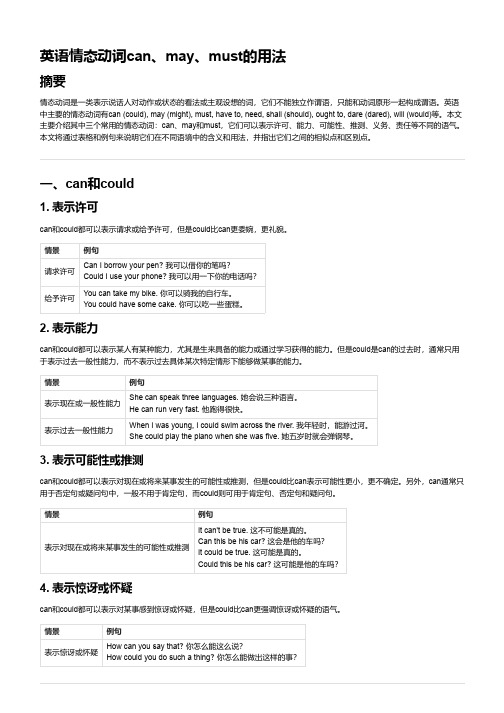
英语情态动词can、may、must的用法摘要情态动词是一类表示说话人对动作或状态的看法或主观设想的词,它们不能独立作谓语,只能和动词原形一起构成谓语。
英语中主要的情态动词有can (could), may (might), must, have to, need, shall (should), ought to, dare (dared), will (would)等。
本文主要介绍其中三个常用的情态动词:can、may和must,它们可以表示许可、能力、可能性、推测、义务、责任等不同的语气。
本文将通过表格和例句来说明它们在不同语境中的含义和用法,并指出它们之间的相似点和区别点。
一、can和could1. 表示许可can和could都可以表示请求或给予许可,但是could比can更委婉,更礼貌。
情景例句请求许可Can I borrow your pen? 我可以借你的笔吗?Could I use your phone? 我可以用一下你的电话吗?给予许可You can take my bike. 你可以骑我的自行车。
You could have some cake. 你可以吃一些蛋糕。
2. 表示能力can和could都可以表示某人有某种能力,尤其是生来具备的能力或通过学习获得的能力。
但是could是can的过去时,通常只用于表示过去一般性能力,而不表示过去具体某次特定情形下能够做某事的能力。
情景例句表示现在或一般性能力She can speak three languages. 她会说三种语言。
He can run very fast. 他跑得很快。
表示过去一般性能力When I was young, I could swim across the river. 我年轻时,能游过河。
She could play the piano when she was five. 她五岁时就会弹钢琴。
3. 表示可能性或推测can和could都可以表示对现在或将来某事发生的可能性或推测,但是could比can表示可能性更小,更不确定。
情态动词小结(共五则)

情态动词小结(共五则)第一篇:情态动词小结情态动词小结情态动词有:can(could),may(might),must,have to, shall(should),will(would),need, dare, ought to等。
一.情态动词can, may, must用法㈠基本用法1.can ⑴ 会,能够--Can you swim?--Yes, I can.--No, I can‟t.⑵口语中代替may.You can(may)park here.你可以把车停在这里。
(许可)2.may允许,许可--May I come in?--Yes, you may./Sure, come on in.--No, you mustn ‟t./No, you can‟t.No, you‟d better not.3.must必须--Must we finish the exercise today?--Yes, you must.--No, you needn‟t./No, you don‟t have to.4.need 需要,必需--Need you go now?=--Must you go now?--Yes, I must.--Yes, I must.--No, I needn‟t.--No, I needn‟t.(need作为情态动词,通常用在否定句和疑问句中。
)注意一:can 与be able to 都可以表示“能力”,区别是:⑴ can只有现在和过去两种形式I can play the piano.She couldn‟t play the piano when she was a little girl.⑵ be able to ①有更多的形式和时态We shall/will be able to finish the work next week.I haven‟t been able to find the book.②指具体一次活动I can swim but I am not able to cross the rough sea.有时两者可以互换: I‟m not able to(can‟t)answer your question.Are you able to(Can you)type(打字)?注意二:could的用法⑴ 作为can的过去式,表示过去的能力。
最新中考情态动词讲解之can,may,must,should区别
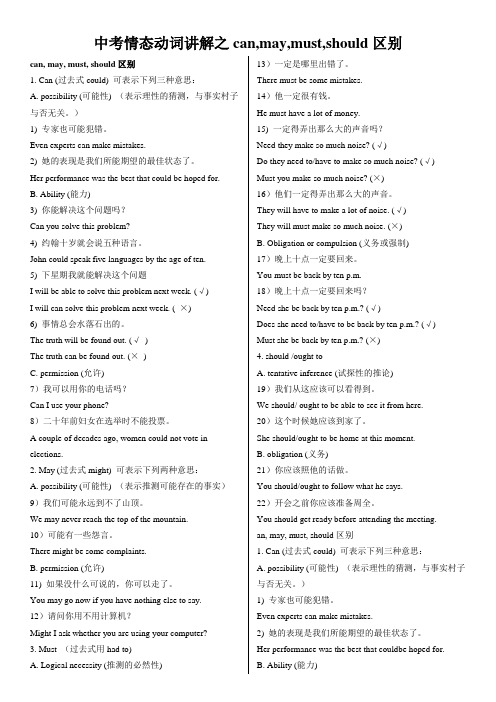
中考情态动词讲解之can,may,must,should区别can, may, must, should区别1. Can (过去式could) 可表示下列三种意思:A. possibility (可能性) (表示理性的猜测,与事实村子与否无关。
)1) 专家也可能犯错。
Even experts can make mistakes.2) 她的表现是我们所能期望的最佳状态了。
Her performance was the best that could be hoped for.B. Ability (能力)3) 你能解决这个问题吗?Can you solve this problem?4) 约翰十岁就会说五种语言。
John could speak five languages by the age of ten.5) 下星期我就能解决这个问题I will be able to solve this problem next week. (√)I will can solve this problem next week. ( ×)6) 事情总会水落石出的。
The truth will be found out. (√)The truth can be found out. (×)C. permission (允许)7)我可以用你的电话吗?Can I use your phone?8)二十年前妇女在选举时不能投票。
A couple of decades ago, women could not vote in elections.2. May (过去式might) 可表示下列两种意思:A. possibility (可能性) (表示推测可能存在的事实)9)我们可能永远到不了山顶。
We may never reach the top of the mountain.10)可能有一些怨言。
情态动词讲解can,may,should,must,oughtto区别及用法,,练习加详解
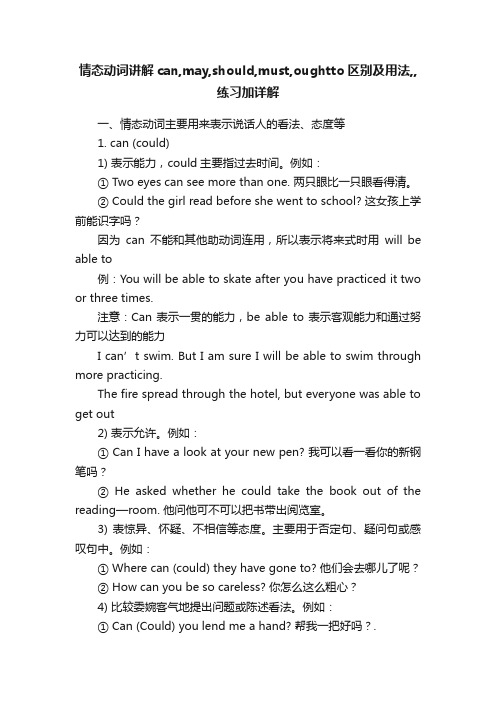
情态动词讲解can,may,should,must,oughtto区别及用法,,练习加详解一、情态动词主要用来表示说话人的看法、态度等1. can (could)1) 表示能力,could主要指过去时间。
例如:① Two eyes can see more than one. 两只眼比一只眼看得清。
② Could the girl read before she went to school? 这女孩上学前能识字吗?因为can不能和其他助动词连用,所以表示将来式时用will be able to例:You will be able to skate after you have practiced it two or three times.注意:Can表示一贯的能力,be able to表示客观能力和通过努力可以达到的能力I can’t swim. But I am sure I will be able to swim through more practicing.The fire spread through the hotel, but everyone was able to get out2) 表示允许。
例如:① Can I have a look at your new pen? 我可以看一看你的新钢笔吗?② He asked whether he could take the book out of the reading—room. 他问他可不可以把书带出阅览室。
3) 表惊异、怀疑、不相信等态度。
主要用于否定句、疑问句或感叹句中。
例如:① Where can (could) they have gone to? 他们会去哪儿了呢?② How can you be so careless? 你怎么这么粗心?4) 比较委婉客气地提出问题或陈述看法。
例如:① Can (Could) you lend me a hand? 帮我一把好吗?.② I’m afraid we couldn’t give you an answer today. 恐怕我们今天不能给你答复。
- 1、下载文档前请自行甄别文档内容的完整性,平台不提供额外的编辑、内容补充、找答案等附加服务。
- 2、"仅部分预览"的文档,不可在线预览部分如存在完整性等问题,可反馈申请退款(可完整预览的文档不适用该条件!)。
- 3、如文档侵犯您的权益,请联系客服反馈,我们会尽快为您处理(人工客服工作时间:9:00-18:30)。
、情态动词主要用来表示说话人的看法、态度等1. can (could)1) 表示能力,could 主要指过去时间。
例如:①Two eyes can see more than one. 两只眼比一只眼看得清。
②Could the girl read before she went to school? 这女孩上学前能识字吗?因为can 不能和其他助动词连用,所以表示将来式时用will be able to例:You will be able to skate after you have practiced it two or three times.注意:Can 表示一贯的能力,be able to 表示客观能力和通过努力可以达到的能力I can ' t swim. But I am sure I will be able to swim through more practicing.The fire spread through the hotel, but everyone was able to get out2) 表示允许。
例如:①Can I have a look at your new pen? 我可以看一看你的新钢笔吗?②He asked whether he could take the book out of the reading —room. 他问他可不可以把书带出阅览室。
3) 表惊异、怀疑、不相信等态度。
主要用于否定句、疑问句或感叹句中。
例如:① Where can (could) they have gone to? 他们会去哪儿了呢?② How can you be so careless? 你怎么这么粗心?4) 比较委婉客气地提出问题或陈述看法。
例如:① Can (Could) you lend me a hand? 帮我一把好吗?.② I 'm afraid we couldn 't give you an answer tod恐ay怕. 我们今天不能给你答复。
Could/can+have done 结构表示对过去发生的事情的“怀疑”或“不肯定”。
could 加完成式还用于肯定句时一般表过去可能完成而却未完成的动作。
Can they have won the basketball match?他们赢了那场篮球赛吗?What you referred to just now can have made her very sad. 你刚刚所谈到的可能令他很伤心。
You could have completed the task a little earlier. 你本来能早点完成任务的。
(但事实上并没有提前完成任务)I could have passed my examination easily but I made too many stupid mistakes. 我本可以轻易通过考试,但我犯了太多不该犯的错误。
如表具体做某一件事的能力时,则须用be able to .He was able to translate the article without a dictionary. 他可以不用词典翻译那篇文章。
2.may (might)1) 表允许,might 可以指过去时间,也可指现在时间,语气更委婉。
例如:① You may take whatever you like. 你喜欢什么就拿什么。
② May (Might) I ask for a photo of your baby? 我可以要一张你宝宝的照片吗?2) 在回答以may 引起的问句时,多避免用这个词,而用其它方式,如Yes, please. / Certainly. / Please don ' t. / You' d better not. / No, you mustn 等,以免'显t得. 太严峻或不客气。
3) may /might 推测性用法可能He may be right. He may not come today ( 可能不) He may /might come tomorrow. 注意: (1)只用于肯定和否定句中,不用于疑问句中。
(2) might 比may 可能性更小He might get a job. He may get a job.(3) may no 可能不can not 不可能He may not come . He can 't come4)表建议(可和as well 连用)You may(might)as well stay where you are. 你还是原地待着好。
(may as well 有―还是⋯⋯的好‖的含义)5)表祝愿May you be happy!6). might 表过去的―可能‖和―允许‖多用于间接引语。
She said that he might take her dictionary. 她说他可以拿她的词典去用。
除在间接引语中外,might 一般不表示过去的“可能”与“许可”。
表过去的“可能”可用could,表过去的“许可”可用were (was) allowed to。
7)might 表现在的“可能‖,其可能性要比may 小。
Electric irons could be dangerous; they might give you a severe shock.8)may (might) + have +done 表示对过去发生行为的推测,含有―想必‖、―也许是‖的意思。
It may have been true. 这事也许是真的。
He might not have settled the question. 他可能尚未解决那个问题。
3. must1)表示义务。
意为―必须‖(主观意志)。
例如:We must do everything step by step .我们必须按部就班地做一切事情。
Why must you always bother me? 为什么你偏要打扰我呢。
2)must be + 表语的结构,通常表示猜测,含有―一定‖之意。
(只用在肯定句中)He must be an honest boy.他一定是个诚实的男孩This must be your room. 这一定是你的房间。
3)must 的否定式有两个:当回答由must 引起的问题时,否定答复要用needn'或t don' t have to表示―不必‖、―无须‖、―用不着‖、―不一定‖的意义。
当表示―不应该‖、―不许可‖、―禁止‖时,就用must not。
Must I go tomorrow? 明天我必须去吗?Yes, please. No , you needn ' t.4)must +have +过去分词的结构,常用在肯定句中,表示对过去发生行为的推测,含有―一定‖、―准是‖的意思。
否定和疑问句用can。
She must have studied English before.她以前一定学过英语。
5)区别:have to 的含义与must 是很接近的,只是have to 比较强调客观需要,must 着重说明主观看法。
I must clean the room. (主观想法)I have to clean the room.(客观需要)另外,have to 能用于更多时态:We had to be there at ten .我们得在十点钟到那里。
We will have to reconsider the whole thing.have to 的否定式:don't have to do表示―不必做⋯⋯‖之意。
4. shall1)表征询意见,用于第一、第三人称疑问句。
例如:① Shall I get you some tea? 我给你点茶好吗?② Shall the boy wait outside? 让那男孩在外面等吗?2)表说话人的意愿,有―命令、允诺、警告、决心‖等意思,用于第二、第三人称陈述句。
例如:① You shall do as I say. 按我说的做。
(命令)② You shall have my answer tomorrow. 你明天可以得到我的答复。
(允诺)③He shall be sorry for it one day, I tell you. 有一天他会后悔的,我告诉你。
(警告)④Nothing shall stop us from carrying out the plan. 什么也不能阻止我们执行这项计划。
(决心)5. should1)用于第一人称疑问句中询问对方的意愿,但语气较委婉温和,如:What should we do now? 我们现在该怎么办?2)表示应该、必须,常与must 换用。
例如:We should (must) master a foreign language at least.3)(表示不确定)万一。
例如:① If I should see him, I'll tell him. 万一我见到他,我就告诉他。
② If it should rain tomorrow, the sports meeting would be postponed. 万一明天下雨。
4)― should+be表+语‖的结构,表示推测或惊奇。
例如:They should be back by now. 他们现在应该回来了吧。
I am sorry that she should be so careless. 我感到遗憾她竟会那样粗心。
5)― should+have过+去分词‖的结构,表示过去该做而实际上尚未做的动作或行为;其否定则表示发生了不应该发生的行为。
其同义结构―ought to have +过去分词‖表,示过去―早应该‖、―本当‖之意,语气较强。
例如:I should have thought of that. 这一点我是应当想到的。
(但没想到)They should not have left so soon. 他们不应当走得这么早。
(但已走了)6)在― It is natural (strange, natural, necessary, surprised, impossible, important ) that 句型中,主语从句中的⋯⋯‖谓语动词要用should +动词原形‖表示―理所当然‖、―奇怪‖、―必要‖、―惊异‖等的意思。
在les(t 以免)、for fear (that)(以防)、in case(以备万一)等之后也要用should+动词原形;在advise, sugest, order, demand, request 等的从句中should+do ‖例如:It is necessary that he(should) be sent there at once.It is strange that he should say so. 他会说这样的话真是奇怪。
